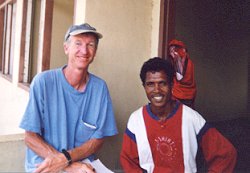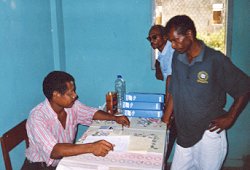

|
DILI, December 2000.
IT IS HARD WORK DRINKING enough to keep properly hydrated. It literally feels like a chore. You have to drink when you don't feel like it or are not even thirsty. Someone said it's only 32C, but, when the humidity is high youand you don't sweat, there's no evaporation: no cooling. At night I lie in bed trying to will heat away from me, but it seems to soak in, instead. Whew!
Liandro gave me a tour of the larger Futo building. It has a first floor and was an Indonesian built block of twelve apartments. To look at them, it must have been reasonably nice. Now, all the doors and all the windows are gone. Every electrical fitting has been ripped out. There is no water. The asbestos ceilings in every room have been holed with rocks. If you are a diehard optimist, you'd say, at least they didn't burn it.

When the Indonesians were here, it sounds like East Timor functioned. But the Indonesian response to the referendum result changed all that. I am staying at the family home of Meno Cordosa, the director of Futo. Meno was a radio broadcaster during the Indonesian occupation and is fluent in bahasa Indonesia, Portuguese and Tetum, as are most people his age. Younger people don't have the Portuguese. Hardly anyone has English.
His brother-in-law Amandeo visited the other night. Amandeo is an agriculture graduate and speaks English well. He said that most people didn't learn English for their own safety. He said that when the Indonesians were there, if a person was seen talking to a malae (foreigner) they would be later taken away and 'questioned' about what you were talking about. Given this, there wasn't a lot of motivation to learn English.
The day after the referendum, when it was apparent how murderous things were getting, Amandeo and Meno's family went to Jakarta where they rented a house for two months, until the UN returned. During that time, everything that was functional in East Timor was either taken away or destroyed. I asked him why Meno's house wasn't burned. He said that army and militia were selective about who they burned out. It seems that the houses of people who had performed functions for the Indonesians weren't burnt, they were just stripped bare.

I don't think all these columns will be too depressing. But the initial reality of East Timor hits you heavily, like the heat.
